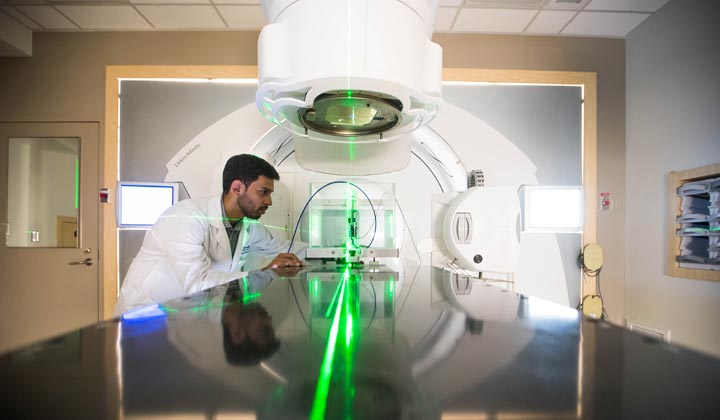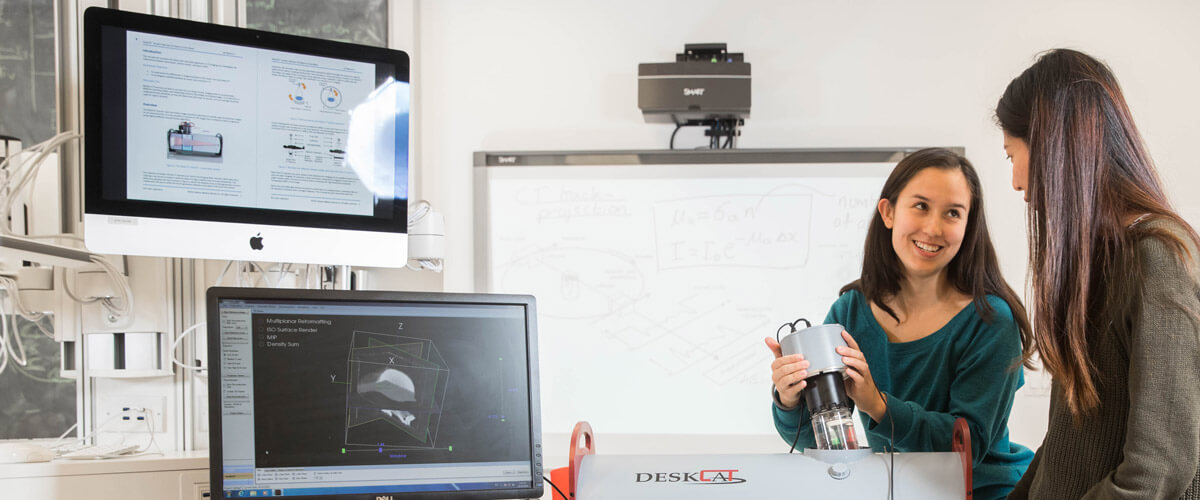Physics (MSc, PhD)
Part of the Faculty of Science

Format: Full-time
Degree Earned: Master of Science or PhD
If you are looking for a challenging career with a positive social impact, this is it. Physics is an exciting, cutting-edge, multidisciplinary field in which MSc and PhD graduate degrees lead to a career in research, biomedical technology or clinical medical physics. Graduate students seeking to enter a medical physics residency program may pursue a CAMPEP accreditation in Medical Physics, which distinguishes our programs.





MSc
- Completion of a four-year undergraduate (or equivalent) degree in physics, biology, engineering, biochemistry, chemistry, or mathematics from an accredited institution
- Minimum grade point average (GPA) or equivalent of 3.33/4.33 (B+) in the last two years of study
- Statement of interest
- Resumé/CV
- Transcripts
- Two letters of recommendation
- English language proficiency requirement
PhD
- Completion of a master’s degree in physics, engineering, or a related field from an accredited institution
- Minimum GPA or equivalent of 3.67/4.33 (A-)
- Statement of interest
- Resumé/CV
- Transcripts
- Two letters of recommendation
- English language proficiency requirement
More information on admission requirements. Due to the competitive nature of our programs, it is not possible to offer admission to everyone who applies that meets the minimum entrance requirements for the program.
Students are encouraged to submit applications prior to the first consideration date to increase their chances of securing financial support for their graduate studies. Applications received after the first consideration date will be accepted and reviewed based on spaces remaining in the program.
See application dates.
For detailed graduate tuition and fees information please visit Fees by Program.
For information on scholarships, awards and financing your graduate studies visit Financing Your Studies.
Fields of Study
- Biomedical Physics - Gain advanced training in the complex interactions of the physical and biological worlds — at the intersection of physics and medicine. The curriculum equips students to meet the large demand for individuals skilled in applying physics-based concepts and methodologies to the diagnosis and treatment of illnesses.
- CAMPEP Medical Physics - Available at both the MSc and PhD levels, our programs are the only ones in the Greater Toronto Area to be accredited by the Commission on Accreditation of Medical Physics Education (CAMPEP).
- Complex Systems - Join an exciting, rapidly growing research area, with broad scope and potential for rich, interdisciplinary collaboration. Our program provides students with a comprehensive foundation in complex systems and interdisciplinary research methods.
Research Areas
The faculty members in the program conduct research in novel ways to model, describe, detect, image and treat diseases through computational and experimental approaches.
Medical Imaging
- Magnetic Resonance Imaging
- Optical Imaging
- Photoacoustic Imaging
- Ultrasound Imaging
Treatment Modalities
- Laser Therapies
- Ultrasound Therapies
- Nanoparticle Mediated Therapies/Theragnostics
- Radiation Therapy and Treatment Planning
Virophysics
- Computational/Mathematical modelling of virus infections in vivo and in vitro
Health Physics
- Toxic and Trace Element Detection in Humans
As a student, you will have access to the following research labs:
On Campus
- Virophysics Computer Laboratory
- Optical Spectroscopy Laboratory
- Biological Systems and Cell Culture Laboratory
- Biomedical Optics Laboratory
- X-ray Fluorescence Laboratory
- Innovative Nuclear Medicine and Radiation Metrology Laboratory
- Radiochemistry & Nanotechnology Laboratory
Located at St. Michael's Hospital
- Advanced Biomedical Ultrasound Imaging and Therapy Laboratory
- Biomicroscopy and Cellular Imaging Laboratory
- Photo-Acoustics Laboratory
Graduate Admissions
Admissions information and how to apply
Graduate Studies Admissions Office
11th Floor, 1 Dundas Street West
Toronto, ON
Telephone: 416-979-5150
Email: gradhelp@torontomu.ca
For information specific to programs please see the program contact information below.
Program Contacts
Dr. Raffi Karshafian
Graduate Program Director
PhD
Research areas: Ultrasound and microbubble mediated therapeutic applications in targeted drug delivery (chemotherapy) and enhancing therapeutic efficacy of radiotherapy. Acoustic behaviour of microbubble contrast agents
Telephone: 416-979-5000 ext. 557536
Email: karshafian@torontomu.ca
Sophia Finos
Graduate Program Administrator
Telephone: 416-979-5000 ext. 554670
Email: biomed@torontomu.ca
"The most exciting part of my research is the potential that bench discoveries will one day impact the delivery of health care as well as advance basic science. [TMU] provides the ideal scientific and academic incubator for success and innovation."
Student Profile: The Seeds of Cancer (external link)
Michael Moore (biomedical physics PhD alumnus) uses photoacoustic imaging to "listen" to tumour cells. Michael conducts his research at iBEST, a partnership between Toronto Metropolitan University and St. Michael's Hospital.

Once you’ve made an informed choice about which program(s) you are going to apply to, preparing your application requires careful research and planning.
Funding
At Toronto Metropolitan University, we understand that pursuing graduate studies is a significant financial investment. Funding comes from a combination of employment contracts (as a teaching assistant), scholarships, awards and stipends. There are a number of additional funding sources – internal and external – available to graduate students that can increase these funding levels.
Research
As an urban innovation university, Toronto Metropolitan University offers 60+ cutting-edge, career-oriented graduate programs, as well as 125+ research centres, institutes and labs, in a wide range of disciplines. Our close connections with industry, government and community partners provide opportunities to apply your knowledge to real-world challenges and make a difference.
